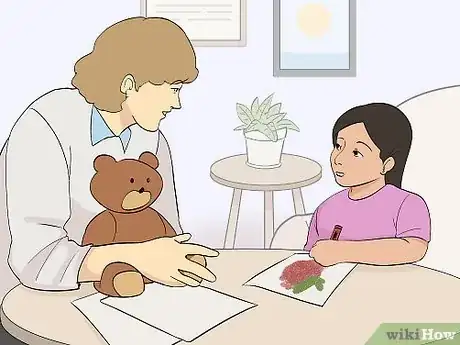This article was co-authored by Tasha Rube, LMSW. Tasha Rube is a Licensed Social Worker based in Kansas City, Kansas. Tasha is affiliated with the Dwight D. Eisenhower VA Medical Center in Leavenworth, Kansas. She received her Masters of Social Work (MSW) from the University of Missouri in 2014.
There are 7 references cited in this article, which can be found at the bottom of the page.
This article has been viewed 14,171 times.
Dealing with a no-show parent is difficult for everyone. While you may feel full of rage in being the bearer of bad news (again), the child likely feels let down and disappointed. When speaking with the child, speak gently without badmouthing or putting down the parent. Express understanding and be emotionally available to the child once they learn the news, allowing them to talk or express their emotions. If the no-shows continue, take action with the parent, the child, and consider involving a therapist for your child.
Steps
Speaking with the Child
-
1Break the news gently. If your first reaction to the no-show is anger, do not speak to the child right away. Gently and compassionately speak to the child and let them know that their parent is not coming. While it’s difficult for you to be the one to break the news, it is very difficult for children to try to understand why their parent would not want to come see them. Speak calmly and don’t let any of your anger come through.
- Consider the child’s feelings as you tell them, keeping the focus on the child and not the parent. For example, instead of saying, “Your parent decided not to show and cares more about themselves than you” say, “Your parent is not coming, and I’m sure it must be very disappointing for you to hear that.”
- Sit down with the child and give your full attention. Say, “I know this is hard for you, but it doesn’t look like they are coming. We can talk about it if you’d like.”
- With younger children, it might be more helpful to engage them in a fun activity as a distraction. For example, you could play a game with them, color with them, or ask them to help you bake some chocolate chip cookies.
-
2Spare the details. If the child is struggling to understand why their parent is not coming, it’s often in their best interest not to go into details. Knowing the reasons may not help the child cope with their feelings of loss or sadness and may confuse them. Especially if you think the parent’s behavior is irresponsible (such as being involved in drugs or traveling from place to place), spare your child the details and keep your explanations simple and brief.[1]
- Say what you know as concisely as possible. For example, say, “I just found out your parent is not coming, and they did not give a reason. I know this is hard to hear, and I’m sorry.”
- If the parent is engaging in dangerous or reckless behavior, spare your curious child these details. However, if they ask why the parent did not show up, then you can offer an explanation. Keep your explanation vague. For example, “Your parent has some things happening in their life right now that sometimes prevent them from seeing you.”
Advertisement -
3Don’t badmouth the parent. No matter how upset or angry you are, don’t say anything harmful about the parent in front of the child. Many children idolize their parents even when they are absent or inconsistent. A child may internalize the comments you make or think that something might be wrong with them for loving their parent. Take any anger or frustration out when the child is not present.[2]
- When interacting with the child, make all your interactions about the child, not the parent. Focus on how the child feels and what the child thinks. Now is not the time for blame, anger, or harsh words.
- Talk about how the parent loves the child. For example, say, “I know it’s hard to understand why your parent didn’t show. I don’t understand either, but I know they love you very much.”
-
4Avoid making excuses. You might try to make up an excuse to lessen the blow of the parent’s behavior. No matter what, a child is hurt by a parent not showing and will likely feel like they are not a priority to their parent. Superhero stories may be exciting, but may ultimately lead to disappointment and distrust in you. Instead, talk about the people the child can count on such as grandparents, aunts, uncles, cousins, etc.[3]
- If the child does not ask for an explanation, don’t offer one. If they do ask for an explanation, then don’t tell a child that their parent is sick, as this may worry the child. Instead, say, “Your parent is having a tough time right now and they are trying to get better. When they do, someone will call you so that you can see them again.”[4]
- You can also say something like, “Let’s think of all of the people in your life who you know love you. I can think of your brother, your sister, the dog, and your neighborhood friends. Who can you think of?”
Expressing Support and Understanding
-
1Allow your child to talk. Validate the child’s experience by listening to them, allowing them time and space to react, and accepting their feelings. A child should know it’s okay to feel sad, upset, angry, frustrated, let down, or confused. Help them identify their emotions and express them in healthy ways. Let them know it’s okay to express these feelings and that you are listening.
- Help a child to identify feelings by saying, “I know this is upsetting” or, “I can tell you’re really sad and disappointed because you wanted to see your parent.”
-
2Say that it’s okay to cry. Some parents may instinctively say, “Oh honey, don’t cry” or, “You don’t need to cry,” yet, it’s important for children to express their emotions. Crying is one way that children can express themselves and feel relieved. Unlike hitting or becoming aggressive, tears can flush emotions in a safe and harmless way. If your child cries, let them know that it’s safe and okay to cry.[5]
- Even if you feel uncomfortable, allow the child to cry and experience the sadness or grief they feel.
-
3Show understanding. If a child is frustrated and upset, let them know that you understand. Bypass the blame and instead model acceptance and understanding. Acknowledge the child’s feelings and the parent’s actions without judgment or finger pointing. When children get older, they want to know why their parent won’t come. Let the child know that they are loved, even when the parent doesn’t show. [6]
- Say, “I am sorry that your parent is not here right now. I am here for you, if you would like to talk about it."
Handling Future Situations
-
1Address inconsistency with the parent. If you are the parent of the child, have a talk with the other parent. Taking care of a child has nothing to do with your past relationship and has everything to do with meeting the needs of your child. Ask them what happened and if there are problems that interfere with seeing your child. Are there logistical problems you need to address? Would a reminder be helpful? Remind yourself that it’s important to your child to have their parent in their life and be willing to make some accommodations.[7]
- Create some boundaries or alternate arrangements to accommodate both of you. For example, find a meeting place that is neutral and convenient for both of you.
- If the other parent is not showing consistency in showing up, ask what ways you can show help. Say, “I’ve noticed you’ve missed some time with our child, and I want to know if there’s anything I can do to make this easier for you or if there’s a way for us to simplify our arrangements.”
-
2Handle the inconsistency with the child. Holding firm expectations for a parent to show up who has an inconsistent track record is going to lead to disappointment and anger. If a parent has shown inconsistency, take some action on your end to address this appropriately with your child. The cycle of anticipation and excitement followed by disappointment and anger can hurt a child significantly, so think about alternative options for your child. However, don’t use this as an opportunity to put down their parent by saying, “Let’s see if your parent comes this year” or, “Don’t get your hopes up because they rarely visit.”[8]
- For a young child, let any visits be a happy surprise for your child. Instead of packing their bags and having them wait by the door or the window, let the visits be fun and exciting surprises for your child and not massive disappointments when there’s a no-show. Say, “Wow, look who came to visit! What a surprise! Let’s get you ready.”
- For the older child, be casual by saying, “Your parent may come by later if they can make it.” By this point, they may recognize the inconsistency and learn not to count on their parent.
-
3See a child therapist. A child who struggles intensely due to an inconsistent or no show parent may benefit from a therapist. A therapist can help the child talk about their feelings and put things in a way that the child can understand. A therapist can also help the child cope with the difficult emotions that arise from the absence of a parent in their life. A therapist can help a child see that expressing difficult emotions is okay and often very helpful.[9]
- Some therapists specialize in seeing kids or families. Ask your physician or insurance provider for a referral to a child therapist. You can also search online or ask for a recommendation from friends and family.
References
- ↑ http://thelifeofasinglemom.com/5-steps-help-child-deal-absent-parent-meg-lowery/
- ↑ http://www.seattletimes.com/life/lifestyle/how-to-help-child-cope-with-a-no-show-parent/
- ↑ http://www.seattletimes.com/life/lifestyle/how-to-help-child-cope-with-a-no-show-parent/
- ↑ https://www.empoweringparents.com/blog/helping-a-child-cope-with-an-absent-parent/#
- ↑ http://www.cyh.com/HealthTopics/HealthTopicDetailsKids.aspx?p=335&np=152&id=2489
- ↑ http://www.jsonline.com/story/life/green-sheet/advice/carolyn-hax/2016/12/10/carolyn-hax-help-child-learn-cope-unreliable-parent/95070764/
- ↑ http://www.womansdivorce.com/inconsistent-visitation.html
- ↑ http://www.jsonline.com/story/life/green-sheet/advice/carolyn-hax/2016/12/10/carolyn-hax-help-child-learn-cope-unreliable-parent/95070764/
- ↑ http://kidshealth.org/en/parents/finding-therapist.html






































































